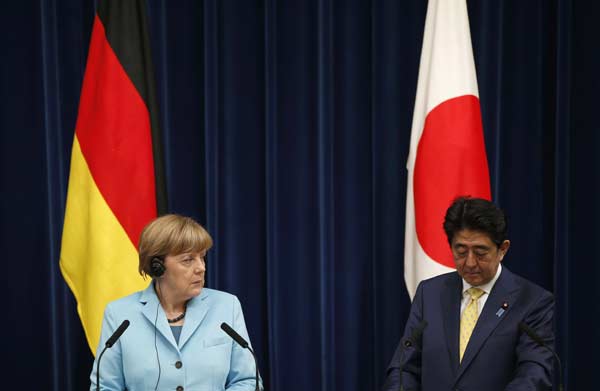 |
|
Germany's Chancellor Angela Merkel (L) and Japan's Prime Minister Shinzo Abe attend their joint news conference after their talks at Abe's official residence in Tokyo, March 9, 2015. [Photo/Agencies] |
With Japanese Prime Minister Shinzo Abe expected to make a statement on the 70th anniversary of the end of World War II, Japan is being haunted by its aggression against other Asian nations in the past century. People at home and abroad are still trying to awaken the nation's conscience to face squarely this part of its history, which Abe and his supporters have so far refused to do.
During her Tokyo visit last week, German Chancellor Angela Merkel gave her host, a polite reminder, if not advice, by talking about her country's way of facing up to the crimes carried out under Nazi rule. She added that this was a precondition for reconciliation with the countries and peoples that had suffered from German aggression.
There are loud voices from people in Japan saying similar things.
Addressing a symposium in Tokyo on March 10, Shinichi Kitaoka, president of the International University of Japan, reminded the Japanese government of the "war of aggression" Japan fought against China in the 1930s and 1940s and the "dreadful things" it did.
"I want Mr. Abe to say, 'Japan committed aggression (against China)'," he was quoted as saying in the Asahi Shimbun.
Kitaoka is the deputy chief of the 16-member panel assigned to advise Abe on his statement, which is due to be issued on Aug 15. At the panel's second meeting on Friday, Kitaoka again defined the Japan's actions as "a war of aggression".
The panel is expected to give Abe a report as a "reference" for Abe's statement.
However, Abe gave his advisory panel a list of topics for discussion, which did not specifically include Japan's wartime actions, instead it emphasized Japan's efforts at postwar reconciliation and what kind of future it should carve out.
In an interview with Reuters, former Japanese prime minister Tomiichi Murayama, who issued the 1995 landmark apology for Japan's wartime aggression, warned that Abe risks further alienating Asian neighbors China and South Korea if he does not stick to the substance of his statement.

I’ve lived in China for quite a considerable time including my graduate school years, travelled and worked in a few cities and still choose my destination taking into consideration the density of smog or PM2.5 particulate matter in the region.